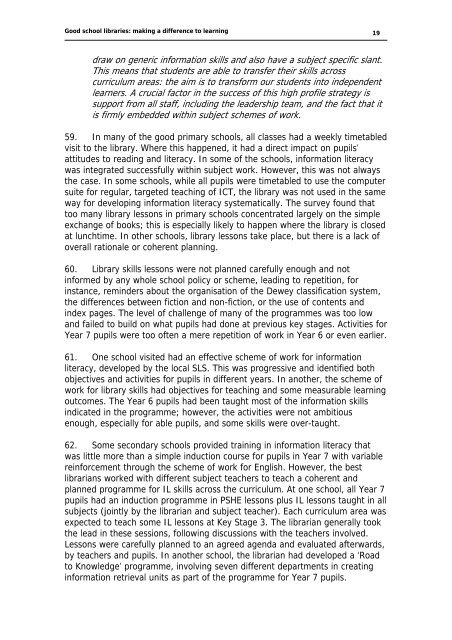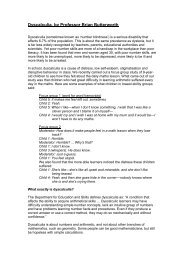Good school libraries: - Digital Education Resource Archive (DERA)
Good school libraries: - Digital Education Resource Archive (DERA)
Good school libraries: - Digital Education Resource Archive (DERA)
Create successful ePaper yourself
Turn your PDF publications into a flip-book with our unique Google optimized e-Paper software.
<strong>Good</strong> <strong>school</strong> <strong>libraries</strong>: making a difference to learning 19<br />
draw on generic information skills and also have a subject specific slant.<br />
This means that students are able to transfer their skills across<br />
curriculum areas: the aim is to transform our students into independent<br />
learners. A crucial factor in the success of this high profile strategy is<br />
support from all staff, including the leadership team, and the fact that it<br />
is firmly embedded within subject schemes of work.<br />
59. In many of the good primary <strong>school</strong>s, all classes had a weekly timetabled<br />
visit to the library. Where this happened, it had a direct impact on pupils’<br />
attitudes to reading and literacy. In some of the <strong>school</strong>s, information literacy<br />
was integrated successfully within subject work. However, this was not always<br />
the case. In some <strong>school</strong>s, while all pupils were timetabled to use the computer<br />
suite for regular, targeted teaching of ICT, the library was not used in the same<br />
way for developing information literacy systematically. The survey found that<br />
too many library lessons in primary <strong>school</strong>s concentrated largely on the simple<br />
exchange of books; this is especially likely to happen where the library is closed<br />
at lunchtime. In other <strong>school</strong>s, library lessons take place, but there is a lack of<br />
overall rationale or coherent planning.<br />
60. Library skills lessons were not planned carefully enough and not<br />
informed by any whole <strong>school</strong> policy or scheme, leading to repetition, for<br />
instance, reminders about the organisation of the Dewey classification system,<br />
the differences between fiction and non-fiction, or the use of contents and<br />
index pages. The level of challenge of many of the programmes was too low<br />
and failed to build on what pupils had done at previous key stages. Activities for<br />
Year 7 pupils were too often a mere repetition of work in Year 6 or even earlier.<br />
61. One <strong>school</strong> visited had an effective scheme of work for information<br />
literacy, developed by the local SLS. This was progressive and identified both<br />
objectives and activities for pupils in different years. In another, the scheme of<br />
work for library skills had objectives for teaching and some measurable learning<br />
outcomes. The Year 6 pupils had been taught most of the information skills<br />
indicated in the programme; however, the activities were not ambitious<br />
enough, especially for able pupils, and some skills were over-taught.<br />
62. Some secondary <strong>school</strong>s provided training in information literacy that<br />
was little more than a simple induction course for pupils in Year 7 with variable<br />
reinforcement through the scheme of work for English. However, the best<br />
librarians worked with different subject teachers to teach a coherent and<br />
planned programme for IL skills across the curriculum. At one <strong>school</strong>, all Year 7<br />
pupils had an induction programme in PSHE lessons plus IL lessons taught in all<br />
subjects (jointly by the librarian and subject teacher). Each curriculum area was<br />
expected to teach some IL lessons at Key Stage 3. The librarian generally took<br />
the lead in these sessions, following discussions with the teachers involved.<br />
Lessons were carefully planned to an agreed agenda and evaluated afterwards,<br />
by teachers and pupils. In another <strong>school</strong>, the librarian had developed a ‘Road<br />
to Knowledge’ programme, involving seven different departments in creating<br />
information retrieval units as part of the programme for Year 7 pupils.



